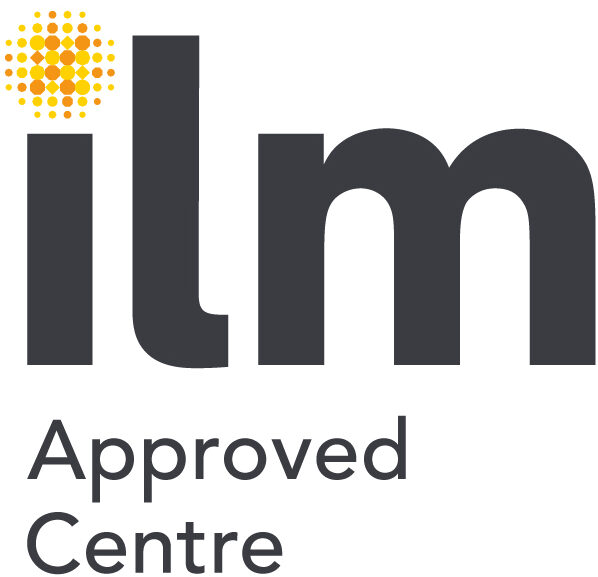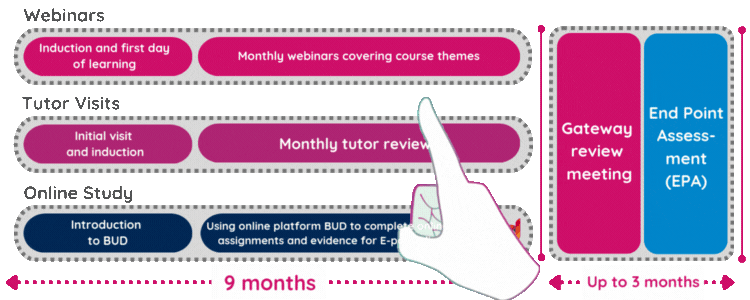At a glance
Course duration
9 Months + assessment
Free for learners - funded via Apprenticeship Levy

Includes
ILM Level 5 Certificate in Effective Coaching and Mentoring
Online learning
and training events
Monthly coaching sessions
Price for this programme: £5,000 £0
This course is fully funded through the Apprenticeship Levy Fund
Who is the apprenticeship for?
The Coaching in Education Apprenticeship Level 5 is designed for professionals across the education sector who are committed to supporting others through skilled, non-directive coaching.
Whether you work in a school, nursery, or multi-academy trust, this programme is for you if you are helping colleagues grow by facilitating reflection, encouraging ownership, and enabling change through coaching conversations.
You may already be applying coaching approaches informally or have some experience in a leadership role. This apprenticeship will deepen your coaching expertise, helping you create lasting impact through meaningful dialogue and developmental challenge.
On completion, you will also achieve the ILM Level 5 Certificate in Effective Coaching and Mentoring—a nationally recognised qualification that enhances your coaching credibility across the education sector and beyond.
This apprenticeship is designed for:
- Senior leaders, assistant heads, and others who use coaching to lead and empower their teams
- Experienced teachers, phase or curriculum leaders, and room leaders fostering reflective practice
- ITT and ECF mentors and facilitators looking to build advanced coaching capability
- SEND and inclusion leads who want to use coaching to enable inclusive, sustainable staff development
- Practitioners and childminders applying coaching principles to support peer growth
- Anyone with coaching or mentoring experience who wants formal recognition through a funded, professional qualification
What will you learn?
This programme develops the knowledge, skills and behaviours needed to become an effective coach within education settings. It combines practical coaching practice with an understanding of organisational contexts, leadership approaches and personal development. Learners complete a structured programme of study, coaching practice, supervision and reflection.
Programme Content
Onboarding and induction: Initial assessment of training needs, guidance on support, and an introduction to the ILM Level 5 qualification requirements, roles and responsibilities, and study skills.
Understanding effective coaching and mentoring:
- Purpose and benefits of coaching and mentoring in organisations.
- Differences and similarities between coaching, mentoring, counselling, training and consulting.
- How organisational context, culture and leadership styles shape coaching.
- Theories of learning, reflective practice and emotional intelligence.
- Diversity, inclusion and motivational theory.
- Codes of ethics, legislation and coaching protocols.
Undertaking coaching in practice:
- Planning and contracting for coaching engagements.
- Delivering a minimum of 18 hours of coaching with 2–3 individuals.
- Using a range of coaching models (e.g. GROW, Thinking Environment, NLP, Gestalt, positive psychology).
- Applying advanced communication skills, questioning, listening and feedback.
- Using tools, techniques and psychometrics to challenge and support learners.
- Record keeping, reflection, supervision and feedback.
Reviewing your coaching ability:
- Holistic review of your development as a coach.
- SWOT analysis and personal development planning.
- Continuing professional development (CPD), supervision and maintaining a coaching log.
Key duties and behaviours:
- Designing and delivering coaching aligned to organisational culture and goals.
- Supporting goal-setting, resilience and professional growth.
- Acting as an ambassador for a coaching mindset, building trust and rapport, and maintaining ethical standards
Register
Coaching in the Early Years Apprenticeship Level 5
Do you work in the Early Years? We run a version of this programme specifically for Early Years professionals who coach others, formally or informally, and want to refine their practice.
Learn more
How is the Coaching in Education apprenticeship delivered?
The Coaching in Education Apprenticeship is designed to be flexible and achievable alongside full-time work. Delivery combines expert-led sessions, tailored support and access to a range of high-quality online resources. You’ll benefit from:
- Monthly online classrooms – live, interactive sessions that build your coaching knowledge and skills over time
- Monthly 1:1 sessions with your dedicated Tutor-Coach – personalised support, progress reviews and targeted development
- Three-monthly tripartite reviews – joint meetings between you, your employer and your Tutor-Coach to review progress, set goals and ensure alignment with your role
You’ll also have access to a wealth of on-demand online resources, tools and activities to support your learning throughout the programme.

Why choose the Coaching in Education Apprenticeship Level 5?
- Gain the ILM Level 5 Certificate in Effective Coaching and Mentoring alongside your apprenticeship, with no extra study or cost
- Master advanced coaching models and techniques: You’ll learn evidence-based approaches like GROW, cognitive behavioural coaching, and neurolinguistic techniques—helping you guide colleagues through real challenges, not just theory
- Enhance emotional intelligence and inclusive practice: By understanding theories from Goleman, Maslow, and Salovey & Mayer, you’ll support colleagues’ wellbeing, motivation, and sense of belonging—especially important when working with SEND staff
- Create better coaching relationships: Strong contracting skills, active listening, effective questioning, and rapport-building tools ensure every coaching conversation is purposeful and trustworthy
- Deliver measurable impact: You’ll be able to evaluate coaching outcomes using ROI models—making professional development transparent and aligned to school priorities
- Steer professional conversations confidently: Learn to manage difficult conversations and ethical dilemmas in a structured way, with a clear understanding of professional boundaries and safeguarding obligations
- Commit to your own growth: The standard emphasises self-awareness, reflection, and ongoing development, supporting you to evolve as a coach even after the apprenticeship ends
Register
Why should schools support staff to complete this apprenticeship?
- Apprentices also gain the ILM Level 5 Certificate in Effective Coaching and Mentoring. This well-respected qualification demonstrates their coaching knowledge and skills to a nationally recognised standard
- Embed a consistent coaching culture: Apprentices bring structured coaching techniques (like contracting and active listening) into daily practice, encouraging growth across the whole setting
- Support inclusion and SEND provision: Coaches trained in emotional intelligence and bias awareness are better equipped to guide staff in inclusive practice—supporting diverse learners and colleagues
- Enable staff to solve real problems: With coaching grounded in goal-setting, evaluation, and reflective practice, your staff can tackle issues such as performance, staff workload, or transitions with clarity and confidence
- Strengthen professional standards and ethics: Apprentices leave settings assured in legal, ethical, and safeguarding expectations—building trust among staff and stakeholders
- Drive leadership capacity from within: Participants gain stakeholder management skills and the ability to coach senior colleagues—bolstering leadership pipelines without needing external support
- Produce evidence of coaching impact: With measurable frameworks (e.g., ROI theories) embedded in practice, your setting will have concrete proof of improvement for external reviews and inspections
Register
Gain the ILM Level 5 Certificate in Effective Coaching and Mentoring alongside your apprenticeship
Alongside the apprenticeship, you will gain the ILM Level 5 Certificate in Effective Coaching and Mentoring. This well-respected qualification demonstrates your coaching knowledge and skills to a nationally recognised standard.
The ILM certificate adds further credibility and flexibility to your professional profile, showing that your coaching practice meets established benchmarks.
This can enhance your standing within your current setting and open doors to new roles and responsibilities. With the ILM Level 5 Certificate included as part of the programme, you benefit from an additional award without the need for extra coursework or fees—making your achievement even more valuable.

What does the apprenticeship cover?
The Coaching in Education Apprenticeship Level 5 is shaped around the Knowledge, Skills, and Behaviours (KSBs) set out in the national Coaching Professional standard. These KSBs are adapted and contextualised for education, so that everything you learn directly supports your work in a school or multi-academy trust.
You will develop and demonstrate:
Knowledge
- Coaching models and approaches: Understand a range of coaching frameworks and how they apply within education
- Learning theories and pedagogy: Explore how adults learn and how this shapes effective coaching in your setting
- Organisational culture and context: Learn how coaching supports school improvement, team development, and positive workplace culture
- Diversity, equality and inclusion: Gain knowledge to ensure coaching practice is accessible and effective for all, including supporting SEND
- Safeguarding, ethics, and confidentiality: Understand your professional responsibilities when coaching in an education environment
Skills
- Building rapport and trust: Develop practical skills to establish strong, supportive coaching relationships with colleagues
- Active listening and effective questioning: Use advanced communication techniques to help others reflect and improve their practice
- Setting goals and measuring impact: Support colleagues to set meaningful goals and track progress over time
- Facilitating professional learning: Guide teams and individuals through structured development and reflective practice
- Managing difficult conversations: Handle sensitive or challenging situations with confidence, always focused on positive outcomes
Behaviours
- Professionalism and integrity: Act as a role model for others in your school or Early Years setting
- Self-reflection and commitment to growth: Continuously evaluate and improve your own coaching practice
- Championing inclusion: Promote a positive, supportive environment where every colleague can develop and thrive
Coaching models you will explore
Throughout the Coaching in Education Apprenticeship, participants are introduced to a range of structured, research-informed coaching models used across education and leadership development. These include:
- GROW – A widely used model that supports goal-setting and problem-solving by guiding conversations through four stages: Goal, Reality, Options and Will
- OSKAR – A strengths-based, solution-focused framework built around Outcome, Scaling, Know-how, Affirm and Review, helping to move colleagues forward through reflective dialogue
- CLEAR – A model designed for deeper coaching relationships, focusing on Contracting, Listening, Exploring, Action and Review, ideal for supporting longer-term development goals. These models provide a flexible toolkit for coaches to adapt to different situations – whether you’re developing new staff, supporting experienced colleagues, or embedding a coaching culture across your school
Am I eligible to be an Education Coach?
To apply for this course, you must:
- Work in an educational setting
- Have held a residency in the UK for the last three years
- Have the right to work and study in the UK
Funding
How do I access the funding?
You can fund the Coaching in Education Apprenticeship through your setting's Apprenticeship Levy. Settings can use their apprenticeship service (AS) account to reserve and allocate funding.
If your setting doesn’t yet have an AS account, just let us know – we’ll guide you through the setup process. The Coaching in Education Apprenticeship is fully funded at £5,000 through your Apprenticeship Levy.
For settings that do not pay into the levy or have used up their funds, the government will fund 95% of the cost (£4,750), with your school contributing the remaining 5% (£250).
What is the Apprenticeship Levy?
The levy is paid by large employers with a wage bill of over £3 million. These employers pay 0.5% of their total annual pay bill into the levy. Most state-maintained schools and multi-academy trusts pay into the levy.
The levy is designed to create long term sustainable funding for apprenticeships and to give employers more control to provide their staff with a range of training opportunities.
Apprenticeship funded training is designed for both new and existing staff members.
If your school is not a levy payer or has exhausted its levy funds, the government will pay 95% of tuition fees with your school paying the remaining 5%. Please contact us if you would like more information.
Related Courses and Content


(2).png)
